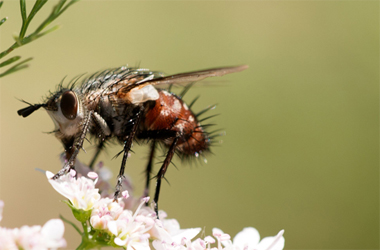Bees are well-documented as the most effective pollinators of crops world-wide. However, the contributions by pollinators other than bees play a significant role in crop production and stability in the face of environmental change. "Non-bee" insects such as flies, beetles, moths, butterflies, wasps and ants were researched in 39 different field studies, across five continents to directly measure their pollination services in comparison to bees. Non-bees performed 25–50% of the total number of flower visits. Although non-bees were less effective pollinators than bees per flower visit, they provided slightly more visits; so these two factors compensated for each other resulting in similar pollination services. This paper suggests that both non-bee and bee insects are required for optimal fruit production, the non-bee insects providing a unique benefit to fruit crops. This research indicates that non-bee insect pollinators play a significant role in global crop production and respond differently than bees to the presence of natural vegetation in the landscape, a finding which has implications for changes in land use. Non-bee insects provide a valuable service and potential insurance against bee population declines. informacion[at]ebd.csic.es: Rader et al (2015) Non-bee insects are important contributors to global crop pollination. PNAS doi: 10.1073/pnas.1517092112
http://www.pnas.org/content/early/2015/11/24/1517092112.abstract








 Las altas temperaturas están provocando que las lagunas y las marismas de Doñana pierdan agua rápidamente
Las altas temperaturas están provocando que las lagunas y las marismas de Doñana pierdan agua rápidamente



